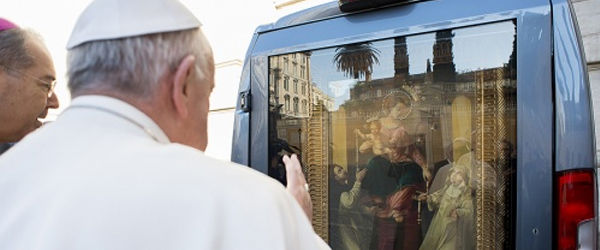There's a disturbing trend within our churches today. Simply put, we are seeing the embrace of our churches become less and less inclusive. More and more, our churches are demanding a purity and exclusivity not demanded by Jesus in Gospels. Indeed, the very word "inclusivity" is often glibly dismissed as being part of the "I am spiritual but not religious" ethos, as if being inclusive were some kind of lightweight, New-Age, thing rather than a central demand within Christian discipleship itself. What does it mean to be inclusive? We can begin with the word "Catholic." The opposite of being "Catholic" is not being "Protestant.” The opposite of "Catholic" is being narrow, exclusive and overly-selective in our embrace. The opposite of being "Catholic" is to define our faith-family too-narrowly. "Catholic" means wide, universal. It means incarnating the embrace of an abundant and prodigal God whose sun shines on all indiscriminately, the bad as well as the good. Jesus once defined this by saying: "In my father's house there are many rooms." God's heart is wide, abundant, prodigal and universally-embracing, a heart that takes care to pray for those "other sheep who are not of this fold." To be "Catholic" is to imitate that. In the Gospels we see that Jesus' passion for inclusivity virtually always trumps his concern for purity and worthiness. He associates and dines with sinners without setting any prior moral conditions that have to be met before those sinners are deemed worthy of his presence. His disciples, much like many good sincere church-people today, were forever trying to keep certain people away from him because they deemed them unworthy. But Jesus always protested that he didn't need that kind of protection and that, indeed, he wanted them all to come to him: Let them come to me! Indeed, that is still Jesus' call: Let them come to me, all of them! We need to be more inclusive. I highlight this because today our faith families are shrinking, and instead of us weeping empathically about this loss of wholeness we are more prone to be secretly gleeful about it: Good riddance; they weren't real Christians anyway! Or, in the words of some Catholic commentators, they were Cafeteria-Catholics, picking and choosing which parts of the Gospel they like and turning a meaty Catholicism into Catholic-Light. Such a judgment, however sincere and well-intentioned, needs to operate under two huge caution flags: First, such a judgment leaves the person making it rather vulnerable. Who is a true, fully-practicing Catholic? Several years ago, I was asked by a Roman Catholic school board to write a definition of what it means to be a "practicing Catholic.” I agonized over the task, examined the classical working definitions for that, and eventually produced a bit of a formula. But I prefaced the definition with this preamble: Only Jesus and Mary were fully practicing Catholics. Everyone else, without a single exception, falls short. We are all Cafeteria-Catholics. We all fall short; all have shortcomings, and all live the Gospel somewhat selectively. To cite the most salient example: Many of us bear down more on church-going and private morality, to the neglect of the non-negotiable Gospel demand apposite justice; others simply reverse this. Who's closer to Jesus? Who's more of a Cafeteria-Catholic? The answer to that question lies inside the secret realm of conscience. But what we do know is that none of us gets it fully right. All of us stand in need of God's forgiveness, and all of us stand in need of the patience of our ecclesial communities. The second caution flag is this: The God that Jesus reveals to us is a God of infinite abundance. Inside God there is no scarcity, no stinginess, no sparing of mercy. As the parable of the Sower makes clear, this God scatters his seed indiscriminately on every kind of soil — bad soil, mediocre soil, good soil, excellent soil. God can do this because God's love and mercy are limitless. God, it seems, never worries about someone receiving cheap, undeserved grace. Likewise, Jesus assures us that God is prodigal. Like the father of the prodigal son and his older brother, God embraces both the missteps of our immaturity as well as the bitterness and resentment within our maturity. Good religion needs to honor that. Today, on both sides of the ideological divide, conservative or liberal alike, we need to remind ourselves of what it means to live under an abundant, prodigal, universally-embracing and "Catholic" God. What it means, among other things of course, is a constant stretching of the heart to an ever-wider inclusivity. How wide are our hearts? Exclusivity can mask itself as depth and as passion for truth. But it invariably reveals itself, in its inability to handle ambiguity and otherness, as rigidity and fear, as if God and Jesus needed our protection. More importantly, it often reveals itself as lacking genuine empathy for those outside its own circle. And, in that, it fails to honor its own abundant and prodigal God. Oblate of Mary Immaculate Father Ronald Rolheiser is a specialist in the field of spirituality and systematic theology. His website is www.ronrolheiser.com.
{gallery width=100 height=100}gallery/2013/0308/rolheiser/{/gallery}

